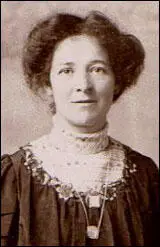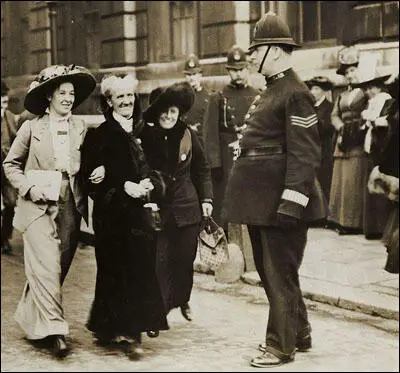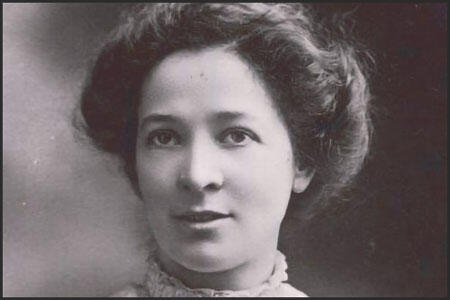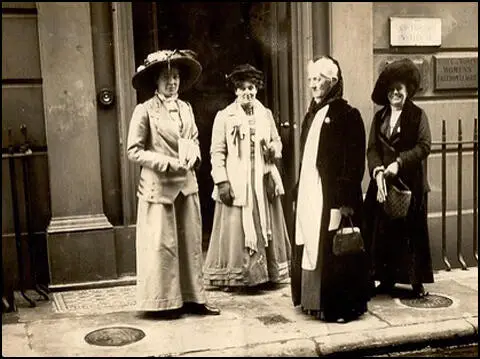Edith How-Martyn

Edith How was born on 17th June, 1875. She was educated at the North London Collegiate School for Girls, a school formed and run by Frances Buss, an early supporter of women's suffrage. After obtaining a degree from University College, Aberystwyth, she became a lecturer at mathematics at Westfield College, but this came to an end when she married Herbert Martyn.
Edith How-Martyn was an early recruit to the Women's Social and Political Union (WSPU) and was arrested in 1906 for trying to make a speech in the lobby of the House of Commons and was one of the first members of the organisation to be sent to prison.
How-Martyn was critical of the dictatorial way that Emmeline Pankhurst and Christabel Pankhurst led the WSPU. At a meeting in October 1907, Edith How-Martyn, Teresa Billington Greig, Charlotte Despard and seventy other women attempted to make the WSPU a more democratic organisation.
When their efforts failed, the three women left the WSPU and formed the Women's Freedom League. This new organisation still took a militant approach but unlike the WSPU the Freedom League concentrated on using non-violent illegal methods. As the leading figure of the Women's Freedom League, Edith How-Martyn urged members not to pay taxes and to boycott the 1911 Census.

After the passing of the passing of the Qualification of Women Act, How-Martin stood as an Independent Feminist candidate in the 1918 General Election. This approach failed to appeal to the electorate and she lost her deposit. How-Martyn had more success when she stood for the Middlesex County Council and became its first woman member.

How-Martyn was active in the campaign for birth-control led by Marie Sopes after the war. How-Martyn was particularly concerned about working class women who had little information how to control the size of their families. In 1929 she founded the Birth Control Information Centre to spread such knowledge.

outside the offices of the Women's Suffrage League (c.1910)
Edith How-Martyn emigrated to Australia in 1939 and died there on 2nd February 1954.
Primary Sources
(1) Christabel Pankhurst, Unshackled (1959)
Parliament reassembled in the autumn of 1906. The militants were there to make the Prime Minister their demand for the vote. Received instead by his spokesman, they were given a negative reply, and on making speeches of protest they were ejected from the building and several - Mrs. Pethick-Lawrence, Mrs. How-Martyn, Annie Kenney, Teresa Billington, Mary Gawthorpe, Sylvia, Adela, and last, but far from least, Mrs. Cobden-Sanderson - were sent to prison. The daughter of Richard Cobden imprisoned by a Liberal Government! This was the strongest evidence of their real illiberalism.
(2) In 1907 Teresa Billington-Greig, Charlotte Despard and Elizabeth How-Martin made attempts to make the Women's Political and Social Union more democratic. When Emmeline Pankhurst responded by cancelling the proposed meeting to discuss the constitution, about seventy women left the WSPU and formed the Women's Freedom League. Teresa Billington Greig described her feelings about this conflict in her book The Militant Suffrage Movement.
In September, about a month before the date arranged for the gathering, Mrs. Pankhurst, ignoring the Honorary Secretary, called a Committee meeting, declared the Conference annulled, the Constitution cancelled, and the rights of the members abolished, and proclaimed herself as sole dictator of the movement. She appointed herself secretary, Mrs. Pethick Lawrence treasurer, and Miss Christabel Pankhurst organizing secretary. She chose for herself a committee consisting of paid organisers and two or three women who were willing to lend their names to this purpose.
The clumsy declaration of autocracy broke the spell of many who would willingly have voted away their rights. Those who stuck to the Constitution formed the Women's Freedom League… This reversion to autocracy, this denial of suffrage in their own society to women seeking suffrage in the State, brought to a sudden close to this stage in the progress of militancy.
(3) In 1914 the Women's Freedom League refused the call off its campaign for women's suffrage. Charlotte Despard, the leader of the Women's Freedom League was a pacifist who refused to become involved in the war effort. In 1916 she made a speech explaining her views.
The great discovery of the war is that the Government can force upon the capitalistic world the superlative claims of the common cause… The Board of Education has concluded that one in six childhood was so physically and mentally defective as to be unable to derive reasonable benefit from the education, which the State provides… My message to the government is 'take over the milk as you have taken over the munitions'.

